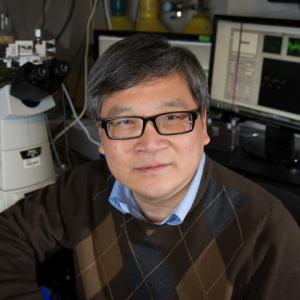Cheng Zhu
Regents' Professor, Wallace H. Coulter Dept. of Biomedical Engineering
Dr. Zhu is a Regents Professor of Biomedical Engineering, Mechanical Engineering, and Physics and holds the J. Erskine Love Endowed Chair in Engineering at the Georgia Institute of Technology and Emory University. His Ph.D. and postdoctoral training with Richard Skalak at Columbia University and University of California, San Diego was on the mathematical modeling of cell locomotion and cell adhesion. But he has also become a self-taught experimentalist since 1990 after he built his own lab at Georgia Tech. A resulting strength of Dr. Zhu’s work is integration of theory and experiment. He pioneered the analysis of interactions at the junctional interface between molecules anchored to two apposing surfaces by inventing the required experiments with custom-design instruments and/or by developing the needed mathematical models. Armed by these powerful tools, the Zhu lab characterized the biophysical regulations of 2D binding and showed their biological relevance. In particular, the Zhu lab has shown that in situ measures of TCR–pMHC and TCR–pMHC–CD8 interactions correspond to T-cell effector functionality. Dr. Zhu also is an internationally recognized leader in molecular biomechanics and mechanobiology. His lab conceptualized and/or demonstrated several types of mechanical regulation of protein unbinding and unfolding (catch bonds, force-history, cyclic mechanical reinforcement, and dynamic catch) in a variety of receptor–ligand systems, including selectins, integrins, platelet glycoprotein Ibα, actin, and T-cell receptors with their respective ligands. More recently, the Zhu lab has developed a fluorescence biomembrane force probe (fBFP) to enable concurrent measurements of force-regulated receptor–ligand interaction and intracellular signaling so triggered. Importantly, the TCR–pMHC catch bond has been shown to correspond to T-cell signaling, providing important support to the TCR mechanosensor hypothesis that underlies the present application. The work of the Zhu lab has resulted in a series high impact papers published in top journals on 2D interaction of pMHC with the TCR and/or the CD4/8 coreceptors, their mechanical regulation, and their relation to T cell biology. He has strong records of fruitful collaborations with the co-PI of this U01, Dr. Michelle Krogsgaard, including joint publications and proposals. These experiences and expertise qualify Dr. Zhu for his role as the Contact PI in this PS-OP application.

